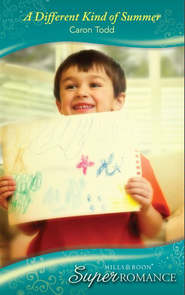По всем вопросам обращайтесь на: info@litportal.ru
(©) 2003-2024.
✖
Small Town Cinderella
Автор
Год написания книги
2019
Настройки чтения
Размер шрифта
Высота строк
Поля
“I suppose it would. Am I fussing?”
“You?”
Emily laughed. “That’s the thing about worrying. It’s hard to know when it’s reasonable.”
“I do understand. What woman wouldn’t? Learned or instinct, we tend to take care of people. School’s out, my dear. We’ve finally got Elizabeth and Jack married and on their way. Isn’t it time to relax and enjoy the summer?”
“Mrs. Bowen mentioned a hammock.”
“What a good idea. Get yourself a hammock and a pile of books and don’t budge for a month. Who knows, maybe your mother will notice the dust and take care of it herself!”
Emily couldn’t help smiling at the thought of her mother minding dust that settled anywhere but on her books.
“Don’t forget,” Eleanor went on, “tea tomorrow afternoon.” Because of the reception and a barbecue planned for later in the week the family wasn’t getting together for the usual Sunday dinner.
“I’m looking forward to it.”
“It’s only you and your mother, and Susannah and Edith and me. I’ve already told Julia that, but remind her, won’t you, Emily?”
“I don’t think she’ll come, Grandma.”
“No, I don’t suppose she will.”
THE COOKBOOKS WERE put away. Julia sat at the kitchen table, this time bent over one of her book catalogs. Emily could see she wasn’t reading it. Her neck and shoulders looked tight and her arms were pressed to her sides, elbows digging in.
“You said you wouldn’t be long.”
“I’m sorry, Mom.” She put the bananas in the fruit basket, the hydro bill on the hutch and the new catalog on the table.
Her mother ignored it. “If you don’t mean ‘not long’ you shouldn’t say ‘not long.’”
“I meant it at the time. Did you worry?”
“I didn’t know I’d have to make lunch. I waited.”
Emily went to the fridge and took out jars of mayonnaise, mustard and pickles, a tomato and their share of the leftover wedding ham.
“Then you still didn’t come. So I had a sandwich.”
“You did?” She put everything but the ham back. “You’re ahead of the game. I haven’t eaten yet.”
“I don’t know why you call it a game.”
“Come on, Mom. You do so. It’s an expression.”
“An odd one.”
Emily cut a slice of ham, then leaned against the counter while she ate it. “Daniel wasn’t home.”
“You see?”
“I sure do. You said he didn’t fall.”
“And he didn’t.”
“Nobody knows where he is, though. Everybody says he likes to follow his inclinations, and if that means a missed wedding or a dried-up garden, so be it.”
Julia looked at Emily’s feet. “His garden dried up?”
That small reaction was more effective than all the reassurance from Daniel’s friends. “It’s strange, isn’t it? And his house plants are half dead. Mrs. Bowen said that’s not like him.”
Julia picked up a pencil and leaned closer to her catalog, her brief interest withdrawn. Emily watched her drift further away, pencil eraser to her lip, finger following the text. Every now and then she marked a title with a star. That meant interested, but not sure. Her library was huge and always growing. Fiction and nonfiction, painstakingly organized, filled floor-to-ceiling shelves on every wall of the living room.
When her mother began circling titles—the next step toward a decision—with the air of someone who was alone in the room, Emily put away the meat and washed the knife, then went outside again. This time the cat followed.
They crossed the crisp, brown lawn and the road, went down one side of the ditch, then up the other and through a narrow band of trees to the creek.
It was low this year. If the heat continued it might dry up completely. The water still bubbled along, though, over smooth, round stones. Emily took off her sandals and waded in, the warm water ankle-deep and cool against her skin.
The cat was still with her. It trotted along the bank, pouncing at rustling sounds, then rushing to catch up. Ahead of it, a red-winged blackbird flitted from grass tip to grass tip. Emily listened to the bird’s piping song and wished for a breeze to cool her head, hot under heavy hair.
“The thing is,” she said to the cat, “not turning up at the wedding, without a word, is odd.”
She had run into Daniel at the post office the day she’d closed the library for the summer, around the time Mrs. Bowen had said he’d left. He’d told her then that he had a speech prepared for the reception. “A few impromptu words,” he’d said, and his eye had flickered in what would have been a wink if he was the kind of person who winked.
At his house she had only looked for him, not for explanations. Now she remembered the coffee cup on the counter, half full with a swirl of murky cream on top, and the sour milk and moldy bread Mrs. Bowen found. Daniel wouldn’t go on an impulsive holiday leaving unwashed dishes and food to spoil.
It hurt a bit that everyone had dismissed her uneasiness about Daniel’s welfare. She had seen that happen to other women—legitimate concerns waved away because they’d reached a certain age without marrying, unspoken needs and fluctuating hormones blamed for their apparent fussing. She was only thirty-two, though, and half the time her relatives treated her as if she was fifteen. Was it the same in the city, or was it only in small places like this that it took marriage to make someone real in other people’s eyes?
Everyone is a pair now, except for Grandma and Mom and me. The thought had never occurred to her before. That was the trouble with weddings, with red-letter days in general. They disturbed the contented flow of things.
Tomorrow, after lunch since it was Sunday, she would ask Mrs. Bowen to let her into Daniel’s house again. If she could find his address book she could contact some of his relatives. With any luck one of them would know where he’d gone.
THE AIRBUS GOT INTO Pearson International from the Bahamas at eight in the morning. At the start of business hours, he picked up a couple of white, no-wrinkle shirts, replenished his supply of batteries—laptop, cell phone and camera—and made arrangements to pick up a car that evening. By noon he was at a lunch meeting, looking out at the SkyDome and wishing there was time to see a Blue Jays game.
The subject on the minds of everyone around the table was the recent discovery of a crash site in northern Manitoba. In 1979 a bush plane had disappeared between Flin Flon and Winnipeg. The plane, a deHavilland Beaver, and the pilot, a D-Day vet and ex-cop by the name of Frank Carruthers, were both considered absolutely reliable. Carruthers had done his preflight check, studied the weather charts, filed his flight plan, then taken off and was never seen again.
Last month a group on a fly-in fishing trip had found the plane’s remains tangled in some dead trees on a lakeshore. What concerned the people in this room was that its cargo—fifteen gold bars—was gone.
Fifteen bars identified by a refiner’s stamp and number, each weighing a thousand ounces. It was more than the mine usually sent out at once. A series of blizzards and a bad flu season had caused the cancellation of a couple of planned flights. Somewhere out there, in the muskeg or underbrush or transformed into gleaming ankle bracelets, was nearly seven million dollars’ worth of gold.
He opened the map he’d bought at the airport. Most of Manitoba’s population was concentrated in a band along the south of the province. The central and northern areas looked almost empty. Lakes, rivers, forests, bogs, tundra. It was easy to see how even something as large as a plane could go unfound for so long.
“Same arrangement as usual,” said the woman at the head of the table. “Expenses and ten percent of what you recover.”
“My partner is already in place.” He refolded the map, leaving it open to show the area northwest of Winnipeg. “We’ll do what we can.”
CHAPTER TWO









